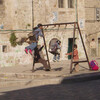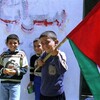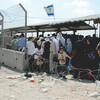
Four weeks of activities launched to mark Palestinian child day
5 April 2005
This year Palestinian Child Day will mark the start of four weeks of UNICEF-supported activities in the West Bank and Gaza, aimed at providing more than 7000 children aged 6-16 years, with a supportive and productive environment. The activities are led by the Ministry of Social Affairs and UNICEF. “The events we are supporting are aimed at making a difference in the lives of the most marginalized children in society,” said UNICEF Special Representative Dan Rohrmann. The activities will be conducted in 15 districts. In cooperation with the Ministry of Social Affairs, the Municipality of Gaza, including the Children Municipality Councils, will help more than 700 kids participating in Fun Days held at safe play areas. Read more about Four weeks of activities launched to mark Palestinian child day








